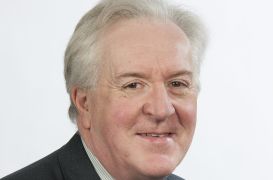‘Covid-light’ hospitals key to restarting routine surgery
Professor Alderson (pictured) told a Commons Health and Social Care Committee inquiry on care during and after the pandemic that surgeons were increasingly concerned about the consequences of suspending services during the crisis. The NHS may need to use private providers and possibly repurpose the Nightingale hospitals as Covid-light sites to catch up waiting lists, he said.
At the end of April, around 4 million patients were on the waiting list, but the NHS Confederation warned recently that the list could grow to between 8 and 10 million by the end of the year.
The NHS and independent providers agreed a deal in March to provide extra capacity. The initial period is due to be completed at the end of the month. However, it has been reported that the Treasury has concerns over the value for money of a Department of Health and Social Care proposal to tackle the backlog by extending the contract.
A Covid-light site is a hospital or unit where, as far as possible, only elective patients who do not have the virus are treated. Professor Alderson said this would present minimum risk to the patient of contracting Covid-19 if they go into the hospital for an elective procedure.
He acknowledged the logistics of establishing Covid-light sites would be considerable. Patients would be expected to self-isolate before going into hospital; they must be asymptomatic and tested shortly before their surgery. Staff would be tested regularly, probably twice a week, with facilities to test patients again if they felt unwell post-operatively.
Professor Alderson said his college had set out a list of operations that should be done within 72 hours, those that could be delayed by up to a month, and those that could wait up to three months. ‘Already those backlogs are beginning to get very close to or beyond the time limits we have set. There is a very strong sense within the surgical community that we have to get on and develop Covid-light sites to start these types of surgery again safely.’
Globally, at the height of Covid infections, 50% of patients who had surgery developed serious pulmonary complications and the mortality in those patients was nearly 40%. ‘We simply cannot advise our patients to have that surgery under these circumstances.’
Public confidence on safety must be restored, together with the belief that the outcomes of surgery were at least as good as pre-Covid levels. Precautions would have to be established. ‘Dealing with the backlog is not something that is achievable in weeks – the idea that we’ve stopped for 12 weeks so we can catch up in 12 weeks. That to my mind is completely unrealistic. It will certainly be many months; it may take us a few years to catch up.’
A long-term deal with the independent sector was needed to help clear the backlog, he added.
‘At the moment and for the foreseeable future, the capacity in the NHS alone is insufficient for us to be able to get surgery started again and maintain a sustainable, resilient service as we move into this winter. That’s why we believe it’s essential we retain access to independent sector facilities for NHS patients so that people can be operated on by priority, by clinical need. I think it would be no bad thing if there was provision made at least to understand how we might retain access to the Nightingale units in a worst-case scenario – second wave, flu epidemics etc.’
There are seven Nightingale hospitals across England and the contract for the use of the first – at London’s ExCel Centre – is due to run out on 26 June. It is understood discussions on the lease of this and the other Nightingale units are ongoing.
An NHS spokesperson said: ‘The Nightingales were and remain an important insurance policy, built to provide back-up capacity to be used as needed during this global pandemic, and the fact that they weren’t needed to anything close to their potential capacity, is good news for the whole country.
‘Although we are through the first peak of this virus, Covid-19 is still having a major impact on everyone’s life so as the NHS begins to bring back non-urgent services, while maintaining critical care capacity and providing rehabilitation care for those who need it, the Nightingales and independent providers will continue to play a part.’
Related content
We are excited to bring you a fun packed Eastern Branch Conference in 2025 over three days.
This event is for those that will benefit from an overview of costing in the NHS or those new to costing and will cover why we cost and the processes.